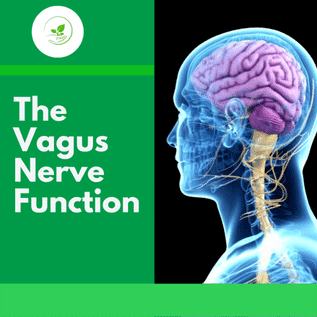
Healing The Vagus Nerve for Stress Relief & Digestion
The vagus nerve—a key player hidden within your body, that may hold the answers to some of your most pressing health questions. Why do some people bounce back from stress quickly while others don’t? How can you enhance your overall health naturally? Join us as we look into the important role of the vagus nerve in your health. Learn how it greatly affects your health, what happens when it doesn’t work right, and the issues that can arise when it’s out of balance. We also share 12 easy techniques to improve your vagus nerve function. By working on the vagus nerve, you can better your digestion, lessen stress, and feel more relaxed, all of which lead to better overall health.
Understanding the Vagus Nerve
The Vagus Nerve: What is it?
The vagus nerve is a crucial nerve that connects the body and brain, influencing various bodily functions and responses. It plays a role in our fight, flight, or freeze stress response, immune function, relaxation, and inflammation control. Dysfunction of the vagus nerve has been linked to trauma, digestive issues, PTSD, migraines, sleep problems, autoimmune diseases, and other health concerns. The nerve also releases acetylcholine, which affects heart rate, blood vessels, and muscles. Inflammation is regulated by the vagus nerve, and its dysfunction can lead to various health issues.
As we get older, the vagus nerve becomes less responsive, which can impact our health. Stress can further weaken the function of this nerve, leading to changes in heart rate, breathing, muscle tension, and cortisol levels. But actively managing stress effectively can enhance it.
The vagus nerve is also linked to the part of the brain that handles our emotions—the limbic system. This includes important areas like the amygdala and hippocampus. This connection shows just how closely our feelings are tied to the health of the vagus nerve.
A common saying in our line of work is, “What happens in VAGUS never stays in VAGUS.” The vagus nerve is unique, when someone has too little vagal tone (which we often see), it can be fatal, but too much vagal tone can also be disastrous.
The Link Between Vagus Nerve Dysfunction and Health Issues
The vagus nerve is implicated in a range of serious conditions, from mental health issues like depression, PTSD, and severe anxiety to digestive disorders such as Crohn’s disease and ulcerative colitis. This nerve’s activity level—whether too low or too high—can significantly impact your overall health.
Health Conditions Linked to Vagus Nerve Dysfunction:
- Cardiovascular Issues: Heart rate irregularities, heart disease
- Neurological Disorders: Epilepsy, migraines, Alzheimer’s disease, multiple sclerosis, seizures, fainting, cluster headaches
- Digestive and Gastrointestinal Disorders: Loss of gag reflex, difficulty swallowing, gastroparesis, constipation, ulcerative colitis, Crohn’s disease, and other GI disorders
- Mental Health and Neurobehavioral Disorders: Depression, mood disorders, anxiety, PTSD, OCD, addiction, trauma, and issues with sexual arousal
- Immune System and Inflammatory Conditions: Chronic pain, inflammation, autoimmune conditions, chronic disease, and other inflammatory processes
- Metabolic and Endocrine Disorders: Diabetes, obesity, blood sugar imbalances
- Miscellaneous Conditions: Bladder issues, a weakened immune system
Our functional health practitioners are skilled at detecting signs that indicate whether your vagus nerve activity is unbalanced. Recognizing these signs is a critical component of our free root cause analysis, which aims to identify the primary factors contributing to your health issues.
Healing The Vagus Nerve
Fortunately, healing the vagus nerve doesn’t require surgery. You can naturally enhance your vagal tone using simple, at-home methods. Improving this critical nerve function can boost your mood, aid digestion, and elevate your overall health.
12 Techniques to Boost Vagal Tone
1.Gargling: This is most likely the easiest and most convenient approach for someone to increase their vagal tone. Try your hardest to gargle with water in the morning. When your eyes start to tear up, you’ll know you’ve activated the vagus nerve.
2.Deep breathing: Vagus nerve stimulation can be achieved by taking deep, steady breaths from the abdomen. Take as deep a breath as you can when you sit or lie down. Hold it for one or two seconds before letting go. Do this 5 to 10 times. Afterward, you’ll experience euphoria and relaxation.
3.Laughing: A lot of neurotransmitters are released during laughter, which enhances vagal tone. Laugh loudly and frequently.
4.Yoga:Yoga’s breathing and asanas aid in digestion and have been demonstrated to raise GABA levels. The vagal tone will be stimulated by increased GABA levels.
5.Singing:The vagus nerve is stimulated while singing because it works the muscles in the back of the throat. To achieve this effect, just be sure to sing loudly. In the car is a fantastic place for this.
6.Cold showers: The Vagus nerve can be stimulated by taking a cold shower or bath, or simply by pouring cold water on your face. Although initially uncomfortable, taking cold showers can significantly enhance vagal tone. The sympathetic nervous system weakens and the parasympathetic nervous system strengthens as your body becomes used to the cold, both of which have an impact on the vagus nerve.
7.Massage: Massage not only relaxes the body but also supports the lymphatic system, which is crucial for removing waste and toxins from bodily tissues. This support can stimulate the vagus nerve, enhancing its ability to manage inflammation and aid immune function. By encouraging lymphatic drainage and circulation, massage helps detoxify the body, complementing the calming and restorative effects of an activated vagus nerve.
8.Aromatherapy: Essential oils like lavender and bergamot have been demonstrated to improve vagal tone by raising heart rate variability. We have a great functional health essential oil blend for Vagus Nerve Support in our online shop.
9.Chanting, chewing gum, humming, coughing, and “OM-ing”: These activities stimulate the vagus nerve directly through vocal and respiratory vibrations, helping to increase vagal tone and promote relaxation.
10.Spend time in the sun:Exposing yourself to sunlight can significantly benefit your vagus nerve. Sunlight increases the production of Melanocyte-Stimulating Hormone (MSH), which plays a key role in reducing inflammation and boosting mood. Regular sun exposure, therefore, can enhance vagal tone, helping to improve your overall emotional and physical health.
11.Tai Chi or meditation: Both Tai Chi and meditation are practices that promote calmness and relaxation. Engaging in these activities can help regulate the body’s stress response and enhance vagal tone by promoting a state of mindfulness and physical balance.
12.Be social: Research demonstrates that social connections strengthen resiliency and enhance Vagus Nerve health.
Conclusion
Maintaining a healthy vagus nerve is crucial for achieving optimal health and recovering from chronic illnesses. Its role in regulating key body functions makes vagus nerve health foundational to your overall well-being. Interested in learning more about how you can support your vagus nerve? Contact us for additional information, or take advantage of our free online root cause analysis assessment for mind and body health today!
What did you think of this blog on the Vagus Nerve Health? Let us know in the comments. If you found this information helpful share it with friends and family to see if it might help them too!



